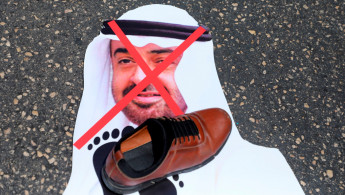Palestinians feel 'betrayal' of Israel-UAE normalisation deal
The Middle East felt shockwaves, after US President Donald Trump announced on Thursday that the UAE had normalised ties with Israel, only the third between the Jewish state and an Arab country, after Egypt and Jordan.
While Israeli Prime Minister Benjamin Netanyahu was jubilant, Palestinians - from the secular Fatah of Mahmoud Abbas to the Hamas Islamists - had only one word on their lips: betrayal.
For the Palestinians, the UAE has sacrificed the Palestinian cause to gain commercial relations with Israel.
On a sunny morning in the Gaza Strip, after another overnight Israeli air strike in retaliation for incendiary balloons, Abu Alaa Al-Sarsak, 70, a former local government employee, shared the sentiment.
But it was also the result of "divisions" among the Palestinians themselves, he said.
For the past 13 years, the Palestinians have been split between Hamas, the rulers of Gaza, and the Palestinian Authority of Abbas, based in the West Bank.
"If the division between the Palestinian Authority and Hamas continues, there will be normalisation with other Arab and Gulf states," Sarsak said.
|
Talal Drimli, an owner of an auto parts store, also attributed it in part to Palestinian internal strife.
"The division (of the Palestinians) encouraged the Emirates to strike a deal with the (Israeli) occupation," the 56-year-old said.
Late Thursday, Abbas and Hamas chief Ismail Haniyeh discussed ways to head off the planned normalisation.
The Palestinians have also called for emergency meetings of the Arab League and the Organization of the Islamic Conference to support their cause.
Normalisation would lead to Tel Aviv-Abu Dhabi flights enabling not only trade but also Emirati visits to Muslim religious sites in Jerusalem, as pointed out by Trump's special advisor Jared Kushner.
'Thrown under the bus'
The Israeli government had previously been discussing implementation of Trump's Middle East plan, in particular annexation of parts of the West Bank.
The UAE had publicly warned Israel against any unilateral annexation, which it said would jeopardise the notion of normalising relations.
On Thursday, annexation was "postponed" and normalisation announced.
But the temporary Israeli removal from the table of annexation of their land has not pacified the Palestinians.
"The Palestinians are furious, they see themselves as being thrown under the bus" by Sheikh Mohamed bin Zayed, the effective UAE ruler, said Yoel Guzansky, an analyst at the Institute for National Security Studies in Tel Aviv.
"The UAE tried to sell a narrative that it did this in order to stop annexation," he said, and "not just to contribute to stability but also to keep the two-state solution alive."
Read also: From Little Sparta to Trojan Horse: Beware the US-Israel-UAE strategic agenda for the Arab region
Annexation of settlements and the Jordan Valley would have fragmented the West Bank to the point that a Palestinian state would been unviable.
For Ali Jarbawi, a former minister and a professor at Birzeit University in the West Bank, it is clear the Palestinian cause is no longer central in regional politics.
"The Palestinians are now facing one of the most difficult times in their history, and their options are limited," he told AFP.
Beyond feeling "betrayed" and "divided", Palestinians are "exhausted", said Samira Ghazal, 21, a secretary in an IT company in Israeli-blockaded Gaza, where unemployment is running at around 50 percent.
"Normalisation has existed for a long time and I do not blame the Emirates for pursuing their interests," she said.
"The people are exhausted and unable to resist," she said. "The Palestinians are weak, the Arabs are weak and Israel is backed by America."
But Jihad Hussein, an office worker in the West Bank political capital Ramallah, remained defiant.
"The Palestinian people have been stabbed in the back by the Emirati leadership, but neither this agreement nor anything else will undermine our will to fight for freedom and independence," he said.
Agencies contributed to this report.
Follow us on Facebook, Twitter and Instagram to stay connected





 Follow the Middle East's top stories in English at The New Arab on Google News
Follow the Middle East's top stories in English at The New Arab on Google News
![The UAE is widely suspected of arming the RSF militia [Getty]](/sites/default/files/styles/image_330x185/public/2024-11/GettyImages-472529908.jpg?h=69f2b9d0&itok=Yauw3YTG)
![Netanyahu furiously denounced the ICC [Getty]](/sites/default/files/styles/image_330x185/public/2024-11/GettyImages-2169352575.jpg?h=199d8c1f&itok=-vRiruf5)
![Both Hamas and the Palestinian Authority welcomed the ICC arrest warrants [Getty]](/sites/default/files/styles/image_330x185/public/2024-11/GettyImages-2178351173.jpg?h=199d8c1f&itok=TV858iVg)